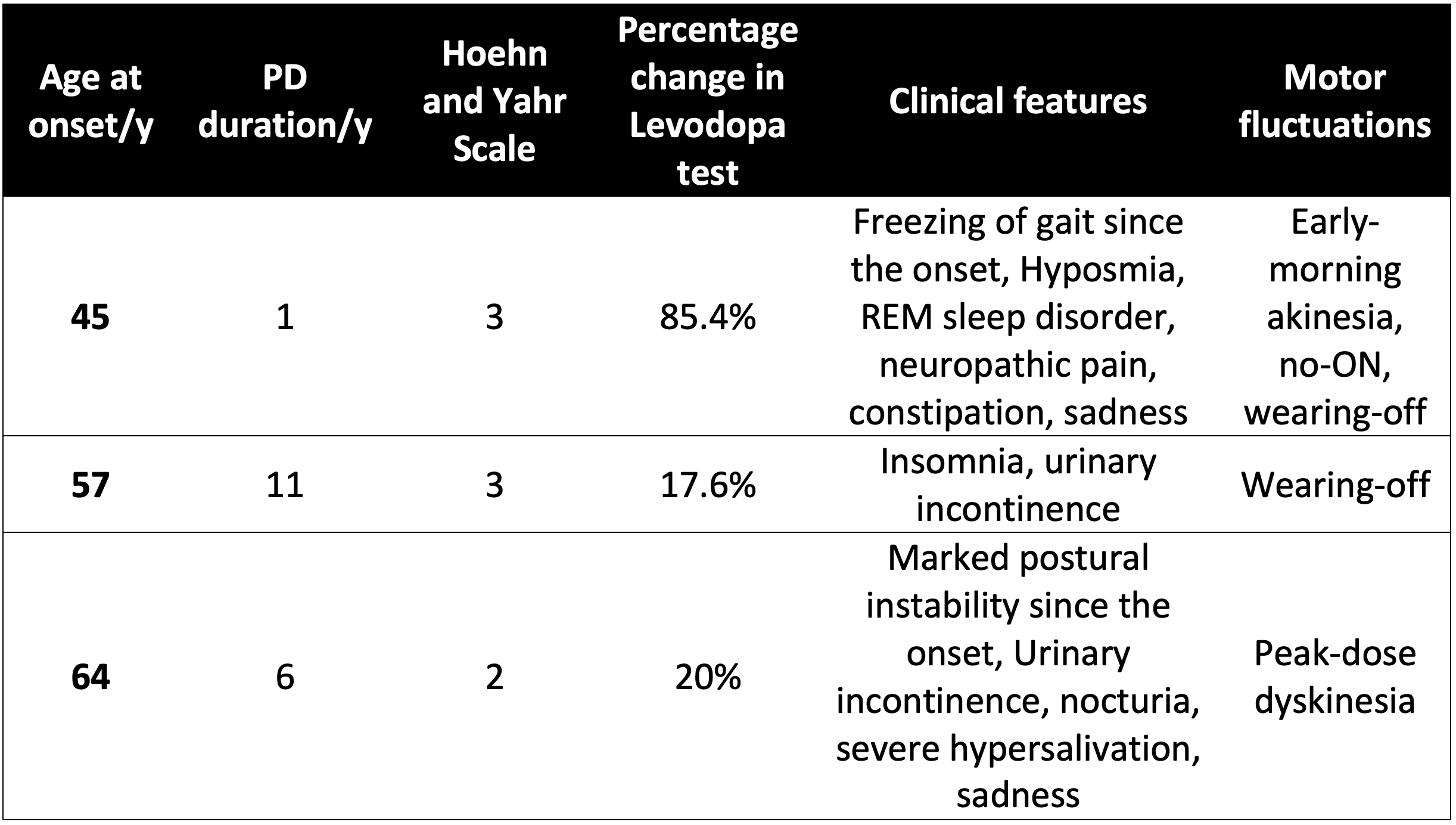Category: Parkinson's Disease: Genetics
Objective: Describe the main clinical features of three subjects with inherited Parkinson’s disease (PD) due to glucocerebrosidase (GBA) p.K198E substitution.
Background: Recessive mutation of the GBA gene causes Gaucher disease and heterozygous carrier status is one of the strongest genetic risk factors for PD [1]. A significant association of GBA mutations in Colombians (9.9% of patients vs. 1.8% in controls) with PD has been described [2]. Strikingly, two cohorts have documented the presence of a population-specific mutation (p.K198E) found only in Colombians [2,3].
Method: We analyzed the clinical information of the subject’s carriers of the GBA p.K198E substitution associated with PD.
Results: All patients were female; the age at disease onset was 61.3 ± 10.8 years, and none with a family history of movement disorders. In two of the three subjects, the initial symptom was rigidity and freezing of gait appeared during the first five years of the disease. REM sleep behavior disorder was seen in 1/3 of patients, and urgency urinary incontinence (2/3); neither had orthostatic hypotension or dysphagia. Cognitive impairment was reported only one of the patients (MoCA 9/30). No symptoms of psychosis or impulse-control disorder were observed.
The UPDRS-III off score was 71 ± 8.8 with higher scores on the pull test, rigidity and bradykinesia items configuring a predominantly akinetic-rigid phenotype in all cases. Two of the three patients had motor fluctuations within the first four years of disease, the most common being wearing off with no significant response to levodopa.
A T2 and FLAIR hyperintensity in medial pontine raphe nuclei was observed on brain MRI in one of the patients.
Conclusion: We present the first clinical description of hereditary PD due to the population-specific GBA p.K198E mutation found only in Colombian. This case series expands the motor and non-motor phenotype associated with this mutation, which could contribute to further evidence of heterogeneity in the effects of different GBA variants on phenotypes [4].
References: [1] Sidransky E, et al. Multicenter analysis of glucocerebrosidase mutations in Parkinson’s disease, N. Engl. J. Med. 361 (17) (2009) 1651–1661.
[2] Velez-Pardo C, et al. The distribution and risk effect of GBA variants in a large cohort of PD patients from Colombia and Peru, Park. Relat. Disord. 63 (2019) 204–208.
[3] Tipton PW, et al. Prevalence of GBA p.K198E mutation in Colombian and Hispanic populations. Parkinsonism Relat Disord. 2020 Apr;73:16-18.
[4] Mata IF, et al. GBA Variants are associated with a distinct pattern of cognitive deficits in Parkinson’s disease, Mov. Disord 31(1) (2016) 95–102.
To cite this abstract in AMA style:
L. Quintero-Giraldo, C. Moreno-López, C. Cerquera-Cleves. GBA p.K198E mutation causing Parkinson Disease in Colombian population: the first clinical description [abstract]. Mov Disord. 2023; 38 (suppl 1). https://www.mdsabstracts.org/abstract/gba-p-k198e-mutation-causing-parkinson-disease-in-colombian-population-the-first-clinical-description/. Accessed December 17, 2025.« Back to 2023 International Congress
MDS Abstracts - https://www.mdsabstracts.org/abstract/gba-p-k198e-mutation-causing-parkinson-disease-in-colombian-population-the-first-clinical-description/

